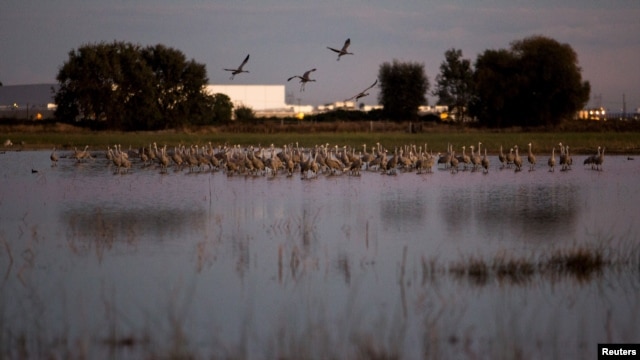VOA Voice of America
California Drought Affects Winter Refuges for Migratory Birds
Sandhill
cranes land in flooded fields at the Sandhill Crane Reserve near
Thornton, California, Nov. 3, 2015. The state's ongoing drought has left
millions of waterfowl that migrate from northern climes to California
with fewer places to land, seek food.
November 07, 2015 10:43 AM
LODI, CALIFORNIA—With
their red heads, 2.13-meter (7-foot) wingspan and a trilling call,
migrating Sandhill Cranes provide a dramatic sunset spectacle as they
land by the thousands in wetlands near Sacramento each night during the
fall and winter.
But the state's ongoing drought has left the cranes, along with millions of other waterfowl that migrate from Canada and other northern climes to spend the winter in California, with fewer places to land, threatening their health as they crowd in on one another to seek shelter and food.
"They're left with fewer and fewer places to go, which will start to have impacts on their population," said Meghan Hertel, who works on habitat issues for the Audubon Society in California. "They can die here from starvation or disease or be weaker for their flight back north."
Beloved sight
The cranes are a beloved sight in California's Sacramento and San Joaquin Valleys when they arrive each fall.
Tourists flock to see them as they take off en masse at dawn or land in a series of swooping, trilling groups as the sun goes down.
But the state's ongoing drought has left the cranes, along with millions of other waterfowl that migrate from Canada and other northern climes to spend the winter in California, with fewer places to land, threatening their health as they crowd in on one another to seek shelter and food.
"They're left with fewer and fewer places to go, which will start to have impacts on their population," said Meghan Hertel, who works on habitat issues for the Audubon Society in California. "They can die here from starvation or disease or be weaker for their flight back north."
Beloved sight
The cranes are a beloved sight in California's Sacramento and San Joaquin Valleys when they arrive each fall.
Tourists flock to see them as they take off en masse at dawn or land in a series of swooping, trilling groups as the sun goes down.
Read More Here


No comments:
Post a Comment
Hello and thank you for visiting my blog. Please share your thoughts and leave a comment :)